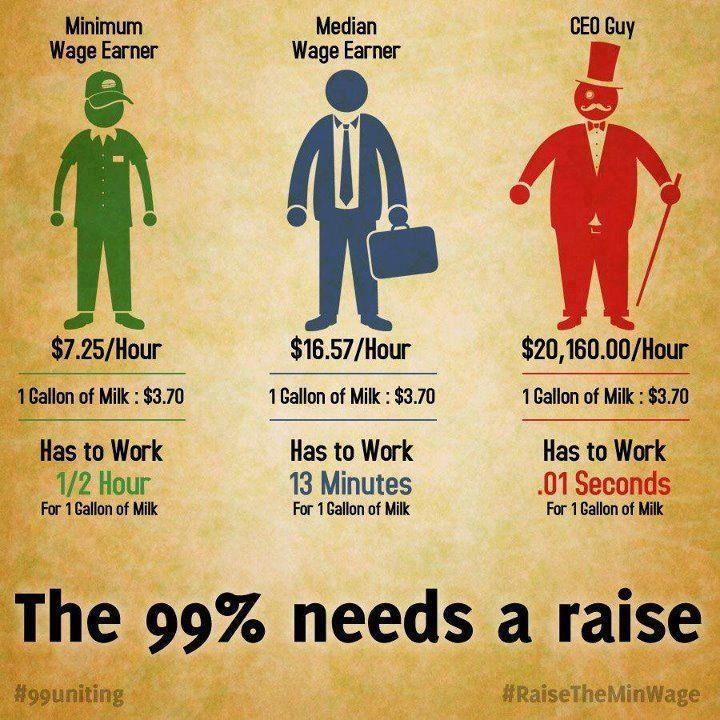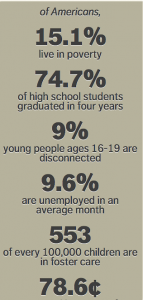Minimum Wage
Employee rights activists Mary Kay Henry and Christine L. Owens write for CNN:
You probably have a gallon of milk in your fridge. It might be fat free, soy, or maybe even 1 percent. Most of us drink milk in some form. But how long does it take for us to  earn enough to buy it?
earn enough to buy it?
As part of their ‘Raise The Minimum Wage’ campaign, 99 Uniting produced this telling infographic, comparing how long it takes a minimum wage earner, a median wage earner and ‘CEO Guy’ to earn a gallon of milk. It makes for some sad and frustrating reading …
Over at The Atlantic, Jordan Weissmann asks whether it is time to raise the minimum wage:

Reawakening the Radical Imagination. Proposed Keystone XL pipeline route may be reassessed. OpEd: The answer is: Spend less. Cornel West keeps the faith for Occupy Wall Street. Most Americans support raising the minimum wage. Smithsonian museum on Jefferson's Bible. Poll suggests evangelicals favor redistribution of wealth. Defining poverty in a land of plenty. Is American becoming a nation of poor children? Are older Americans better off? Immigration in the South. Are unions and young people a winning combination for 2012? Unemployment claims drop for the second straight week. And Christian leaders talk about marriage and sex.

Perhaps the most important finding from the report is that we have both the experience and the policy tools necessary to cut poverty in half.
Between 1964 and 1973, under both Democratic and Republican administrations, the U.S. poverty rate fell by nearly half (43 percent) as a strong economy and effective public policy initiatives expanded the middle class.
Similarly, between 1993 and 2000, shared economic growth combined with policy interventions such as an enhanced earned income tax credit and minimum wage increase worked together to cut child poverty from 23 percent to 16 percent.
We can't do this alone.
| The Daily Show With Jon Stewart | Mon - Thurs 11p / 10c | |||
| Mexed Out | ||||
| ||||
How ironic that for all the protests going on about unemployment these days that a parallel debate is occurring in our agricultural sector: What to do about a shortage of workers to pick crops or care for livestock on U.S. farms.
Walmart has launched a charm offensive as part of its new urban strategy to impose smaller versions of its big box in inner cities across the country. It has proposed four stores for Washington, D.C. -- all in predominantly minority, and most in low-income, neighborhoods.
The debate over building Walmart stores in D.C. is engaging intense public sentiment, and for good reason. While Walmart promises new jobs in a community, in reality it displaces other local businesses, leaving in question whether there is a net jobs gain; one study showed that for every retail job Walmart brought, communities lost 1.4 other jobs. In addition, Walmart passes on the cost of its low wages to taxpayers when associates and their families rely on publicly funded health care and other assistance programs.
After months of good-faith reforms and patience, the drama is back in Egypt's Tahrir Square as protesters are preparing for a potential showdown with the state's military rule. The movement, among other things, is demanding an end to military rule -- a more radical call that reflects both the frustration with the status quo and the hope for a better way.
Two weeks ago, at the "Day of Persistence," Egypt saw its largest resurgence of public protest since former President Hosni Mubarak was ousted in February. The nation-wide protests show Egyptians camping out in Cairo's Tahrir Square, staging sit-ins and blocking traffic in Alexandria, and threatening to shut down Suez's tunnel access to Sinai. So why are the people confronting -- albeit nonviolently -- an interim government that has promised elections and a new constitution? A glance at the collective demands drafted in Tahrir Square make clear that the movement's demands -- both political and economic -- have not progressed much under the military rule of the Supreme Council of the Armed Forces.
In 2010, the moral measure of tax policy choice is: Does it further concentrate wealth and power in the hands of a few?
While it's generally not worth spilling any ink over Glenn Beck, his recent attacks on churches that preach "social justice" has rightly earned the condemnation of diverse faith leaders
To work is to pray.
It's a Latin phrase that the Order of St. Benedict adopted as its motto.
St. Benedict, the founder of the order, recognized the sacred value of hard work, the notion that through the sweat of our brows and the strength of our arms and backs, we can worship the Creator.
If a budget is a moral document, what should be said about the president's proposed budget for 2010? I focus here on what this budget proposal says about justice for poorer Americans.
In January, the new Democratic House passed a clean minimum wage bill, but in early February the Senate tagged on $8.3 billion in tax cuts for businesses, effectively delaying final action until a
